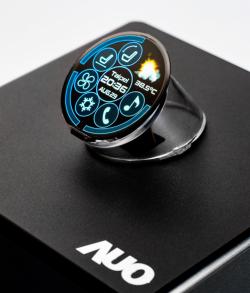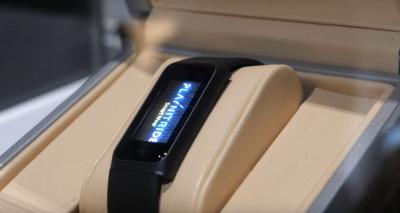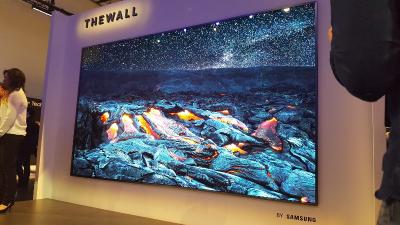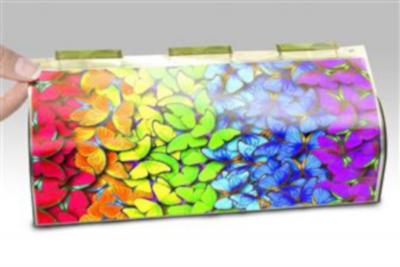AU Optronics shows its microLED display prototypes at SID Displayweek 2021
AUO Optronics is showing its latest microLED ALED display prototypes at SID DisplayWeek 2021. Most of these aren't new display (AUO already demonstrated these last month) but it's the first time we got these on video:
You can see the 1.39" 472x472 (338 PPI) full-circle microLED display, developed together with PlayNitride. You can also see AUO's 12.1-inch 169PPI microLED display it first demonstrated in SID 2020, and the 9.4-inch 228 PPI flexible microLED prototype it also developed together with PlayNitride.
AUO developed a 1.39-inch 338 PPI full-circle MicroLED display
AUO Optronics will demonstrate several new MicroLED display prototypes at Touch Taiwan 2021. AUO now brands its microLED displays as ALED displays.

The first display, which you see above, is a 1.39-inch 472x472 (338 PPI) full-circle microLED display. AUO says that this is the highest-density MicroLED display ever developed. AUO did not disclose more about this display (which was developed together with PlayNitride) but the company says that it offers ultra-wide viewing angles and high brightness.
PlayNitride starts to construct its 2nd microLED production line
Last month we reported that Taiwan-based microLED developer PlayNitride is planning to raise $50 million to establish its second microLED production line. According to Digitimes, the company secured the first part of the $50 million financing round, and is starting to construct the second production line.
PlayNitride hopes to start volume production in the new line by Q2 or Q3 2021. This new line will expand the company's microLED production capacity by 2 to 3 fold. Digitimes also updates that by the end of 2021, the company plans for an IPO at the Taiwan Stock Exchange.
AUO shows its automotive and flexible microLED displays at SID Displayweek 2020
AU Optronics released this nice video that shows its latest microLED display prototypes. First up is the company's 12.1" automotive display. This one features a 1920x720 (169 PPI) resolution, and is made on an LTPS backplane. This display was shown first in 2018.
The second display in the video is the flexible microLED developed in collaboration with PlayNitride. This is a 9.4" 228 PPI display, again driven by an LTPS backplane.
RiT Display shows a microLED wearable display prototype
In December 2019 Taiwan-based PMOLED display maker RiTDisplay announced that it plans to launch its first MicroLED displays in 2020. Last week during SID Displayweek 2020 the company demonstrated its first prototype, as can be seen in the video below.
The company did not reveal any technical specifications or discuss any commercialization plans.
PlayNitride launches new displays at SID 2020
PlayNitride introduced several new display technologies at SID DisplayWeek 2020. First up we have the PixeLED Matrix, which is a tiled microLED display module based display, each produced on its own PCB.
Each PixeLED module is made from 16 pixels (4X4), and can reach pitches of 0.3-0.4 mm. PlayNitride says that this technology can compete with mini LED displays, and says that it achieves a superior contrast and can also be fitted on curved surfaces. PixeLED displays can be used for TV displays, for commercial signage displays and also for automotive lighting. The display can currently achieve a maximum brightness of 2,000 nits.
PlayNitride to raise $50 million to establish a second production line, first microLED wearable displays expected to ship in 2021
In July 2019 Taiwan-based microLED developer PlayNitride raised $50 million to start trial production of microLED displays. According to a new report from Taiwan, the company plans to raise an additional $50 million by the end of September 2020 to funds it second microLED production line.

PlayNitride started volume production at its first production line in 2019, for small wearable displays, and the first displays are now being "validated" by customers. Shipments are likely to begin next year.
Samsung faces technical issues and will have to delay the launch of its true microLED TVs
According to reports early in 2020, Samsung Electronics partnered with Epistar and PlayNitride that will enable Samsung to release its first true microLED TVs by the end of 2020. A new report from Korea suggests that Samsung is struggling with technology issues and it is not likely it will meet its goal of a product release in 2020.

The reports suggest that production yields are very low - apparently Epistar is not able to provide Samsung with the millions of microLEDs required to produce its TVs. Another major issues is Samsung's transfer process which is still not accurate enough - with the result being that display assembly yields are painfully low.
PlayNitride plans to reduce microLED chip prices by 95% within 5 years
PlayNitride says that in order to meet mass production goals, microLED chip prices will have to be reduced drastically. The company aims to reduce the production cost of microLED chips by 95% within five years.
PlayNitride's CEO, Charles Li, says that the main challenge right now is to reduce the cost and size of microLED chips. In addition microLED makers will have to integrate the entire supply chain - from LED wafer production and process to transfer technology, backplane production and display module fabrication. Good technologies are available for all these steps, but integration is now key.
AUO and PlayNitride co-developed a 9.4" 228 PPI flexible automotive-grade microLED display
AU Optronics and PlayNitride announced that the two companies have developed a 9.4" 228 PPI flexible microLED display. The new display is driven by an LTPS backplane and the two companies say it delivers a large color gamut, is weather resistance and it is suitable for automotive applications.

AUO and PlayNitride has been collaborating on microLED display technologies for many years. In early 2019, AUO announce it plans to accelerate its development of Micro-LED products. The company previous prototype was a 12.1" 1920x720 (169 PPI) panel. In September 2019 AUO's president said that he expects Micro-LED displays to enter the market within 1-2 years, starting with large-area signage and small-sized VR displays.
Pagination
- Previous page
- Page 3
- Next page

